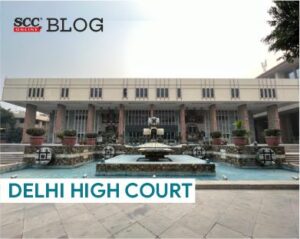Delhi High Court: In an appeal filed under Section 37 of the Arbitration and Conciliation Act, 1996 challenging Claims B and D only, against the impugned judgment passed by the Single Judge granting Claim (A) in favor of the respondent as the obligation to pay rent was mentioned only in the Collaboration Agreement, which was not produced and thus remained unproved. Claim (B) was modified by restricting the damages for deprivation of property to Rs.35,000/- per month for the period commencing from May 2006 till the date of termination of the Collaboration Agreement. Claim (D) for the grant of damages of Rs. 25 lacs on account of mental agony, humiliation, and harassment suffered by the respondent, as awarded by the learned arbitrator, was not interfered with, a division bench of Najmi Waziri and Vikas Mahajan, JJ., upheld the impugned judgment and found deprivation of property (Claim B) and award of damages for mental agony (Claim D) as tenable in law.
Surinder Kumar Dewan (respondent), the absolute owner of the property forming subject matter in the present litigation, entered into the collaboration agreement with Tejpal Singh (appellant) wherein it was decided that at a new building would be raised in conformity with the sanctioned plan. The entire construction cost and other expenses were to be borne by the appellant.
However, as per the approved sanctioned plan, construction could be raised only up to the second floor, but the appellant not only raised unauthorized construction on each floor but also constructed an additional floor i.e., the third floor, which was totally unauthorized. The illegal third floor and unauthorized portion on each floor were demolished by the Municipal Corporation of Delhi and the building was sealed. However, when the building was de-sealed to remove unauthorized construction, the appellant started construction of third floor instead of getting the unauthorized portions regularized
This led to MCD sealing the entire property and registering an FIR, pursuant to which, the respondent terminated the Collaboration Agreement and invoked the arbitration clause and award was granted. The appellant assailed the award by filing a petition under Section 34 of the Arbitration and Conciliation Act, 1996, laying a challenge to Claims A, B and D.
Claim B — Deprivation of Property
The Court noted that there is voluminous evidence on record which establishes that unauthorized construction was done by the appellant contrary to the sanctioned plan which also led to violation of the sanctioned plan and registration of an FIR against the respondent.
Thus, the Court concluded that the appellant was in breach of the Collaboration Agreement which led to the deprivation of use of the property by the respondent and remarked that as far as the quantum of Claim (B) is concerned, the same has not been questioned in the instant appeal.
Claim D- Award of sum of Rs. 25 lakhs towards damages on account of mental agony, harassment suffered by the Respondent
On the submission made by the appellant that the collaboration agreement is a commercial contract and in such contracts no damages on account of mental harassment or agony could be awarded, the Court clarified that it is not just a case of breach of contract simpliciter. The respondent who was 72 years of age at the relevant time was not only deprived of his property but had to face the agony of sealing of his property by the MCD due to unauthorized and illegal construction raised by the appellant.
Placing reliance on R. Padmanabhan v. R. Natesan, in Civil Appeal No. 16930 of 2017, decided on 23-10-2017, the Court further noted that the respondent who is a senior citizen had to undergo harassment of facing a criminal case and the threat of arrest on account of illegal designs and acts of omission and commission on part of the appellant in raising construction in excess of the approved sanctioned plan and failure on his part to remedy the breach.
The Court remarked that it could not have been reasonably foreseen by the respondent that due to the illegal and nefarious acts of the appellant, a criminal case would be registered against him. Possibly for this reason, a clause providing for damages for mental agony and harassment does not find a place in the collaboration agreement. Thus, the arbitrator awarded the damages for mental agony and harassment undergone by the respondent which was later affirmed by the Single Judge.
The Court held that the respondent had to face mental agony and harassment directly on account of the nefarious acts of the appellant and upheld the impugned award.
[Tejpal Singh v. Surinder Kumar Dewan, 2022 SCC OnLine Del 4667, decided on 13-12-2022]
Judgment by: Justice Vikas Mahajan.
Advocates who appeared in this case :
Mr. M. Tarique Siddiqui, Mr Bhagat Singh, Mr. Manish Gusain, Mr. Md. Noumaan and Ms. Jyotsna Bhardwaj, Advocates for appellants
Mr. Anil K. Kher. Sr. Advocate with Mr. Kunal Kher, Advocate for respondent
*Arunima Bose, Editorial Assistant has reported this brief.

